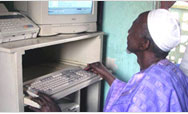You are here » Home » Telling Our Story
Photo & Caption
Women Fight Malaria and Earn More

| |
Photo: USAID/Matar Camara
|
|
Fatimata Diara Coly, left, President of Allabatou Women’s Group, speaks with members and visitors about the group’s malaria prevention and income-generation activities.
|
The women of Bignona in Senegal’s lush Ziguinchor region have suffered more than anyone there from malaria. They have lost children to the disease, spent scarce resources, and missed work to care for others. That is why hundreds of small, community-based groups have teamed up with USAID to help prevent malaria.
One of the most effective ways to prevent malaria is to sleep under an insecticide-treated bed net at night, when mosquitoes are most active. But for many, the nets are too expensive. The women of Bignona and USAID are making bed nets widely available and affordable in their community.
Here’s how the program works: in Senegal, many women belong to financial solidarity networks. Each month, they contribute a small amount to a revolving fund. When a member needs money, often for her business, she borrows from the fund. USAID is providing Allabatou, one of these groups, with bed nets for $6 each. Members purchase nets on credit and repay Allabatou over five months. Allabatou charges a $1 commission on the nets. With that money, it supports both its revolving fund and anti-malaria efforts. Systems like these have been shown to be more effective than programs that give nets away free of charge. Pregnant women and children under five get the nets at a subsidized price of $2.
Having fewer malaria cases prevents women from missing work to care for sick families. “Before this program, every week, three or five of us used to spend two, three days caring for our children or husbands or other family members sick with malaria. Now, we’re all here at work,” said Khady, an Allabatou group member.
Malaria is a major killer of children in Senegal and a leading cause of illness among adults. USAID supports a comprehensive package of clinical services and community interventions to prevent illness and death due to the disease.
Print-friendly version of this page (563kb - PDF)
Click here for high-res photo
Back to Top ^ | 

